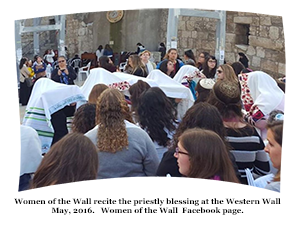 HYPOCRISY: When Jewish Women Wail About Their Rights To Rituals That Are The Basis of Jewish Discrimination
HYPOCRISY: When Jewish Women Wail About Their Rights To Rituals That Are The Basis of Jewish Discrimination
Avraham Burg Jun 17, 2016 HAARETZ
For many long years I’ve been following the struggle by the Women of the Wall with (lack of) much interest. I don’t feel very connected, if at all, to this battle which I should ostensibly be supporting with all my heart. Aside from the fact that in the pluralistic society to which I aspire every man and woman should be allowed to be religious in their own way, I have nothing in common with them. On the contrary; their Judaism is not my Judaism and their rituals are the essence of idolatry from my perspective. Just like the rabbinic establishment they are fighting.

The story of the wall is even worse then suggested Mr. Burg. The Second Temple itself was not a creation of the indigenous Hebrews but of a small group of subjects of the Persian emperor to create a theocratic rule under the umbrella of his empire. Under Nehemiah, this group of descendants of the Jews taken as hostages to Babylon imposed their rule over other Hebrews who had not been taken hostage. The resulting theocracy, later subject to Greek, then Roman rule, was the basis for the corruption that underlies the stories of both the Christian Bible, and the writings of Josephus about our war of resistance against Roman rule. The wall itself, was built by Herod, a non-Jewish ruler imposed on us by Rome.
If they were as straightforward and honest as Moshe Feiglin and MK Yehuda Glick and wanted to rebuild the Temple and restore the Temple Mount I would oppose them with all my strength but I could at least discuss it. But the Western Wall? No matter how you look at it, it has no intrinsic holiness. It’s an external support wall (not even a wall of the Temple itself) that held up the man-made hill on which Herod’s Temple was built. It became holy only in modern times. It’s an invented religious site, and there’s no difference between the rituals that have developed around its stones than any of the pagan displays that characterize the contemporary Judaism of wood and stone. On this issue the Women of the Wall and I can find no common ground.
To clear up any doubts, I have no longing for the Temple that was, nor do I yearn for the Temple that I hope will never be. I understand the religious exaltation that cannot be defined by human languages and senses. But the Temple is not that; on the contrary. As opposed to a lofty and abstract idea, the ancient Temple was nothing but a compromise between the idea of a God who “has neither a semblance of body nor a body,” and the need of less sophisticated believers for a tangible ritual object — a calf, a hut, an altar, blood, the smoke of the animal sacrifices and the glory of the priests.
It’s no coincidence that in those years when the Second Temple stood it eventually became a focal point of religious, political and government corruption. The destruction of the Temple, with all the pain over the loss of life and the end of Jewish political independence, also put an end to Jerusalem’s religious corruption and led to the birth of the ancient reform movement.
In Yavneh, far from Jerusalem, a different type of Judaism began to emerge that made human beings central (“What is hateful to you, don’t do to your fellow; that’s the entire Torah”). The Jewish renewal of the 2nd century C.E. has shaped Jewish consciousness to this day.
Therein lies the first absurdity of Women of the Wall. Before our very eyes a fundamentalist partnership (one that wants to return to both real and imaginary basics) is emerging between anachronistic rabbis and allegedly progressive women, who want to bring a broken institution back into the center of our spiritual experience.
If these brave women had been offering a complete alternative to the awful, limited Judaism that has taken over our lives, I would listen. But they’re not. They essentially want to be accepted as kosher by a world of content and symbols that, like an impure vessel, can only be repaired by smashing it. I don’t see any point in appropriating a symbol here and a position there when the entire contemporary rabbinical system is invalid. We have to replace it and negate it, not try to imitate it.
On those occasions when I expressed my opinion to the group’s activists or to their North American donors and supporters, I was given the cold shoulder at best. But now, with their new campaign to conduct a “priestly blessing” by women, my opposition has turned into genuine laughter. It’s simply amazing to see an idea collapse into itself.
Many may be familiar with the Gershom Scholem’s prophecy at the beginning of the 20th century that, “God will not remain mute in the language in which he has been entreated thousands of times to return to our lives.” But fewer may know one of the earlier warnings from the same essay: “If we … revive … the language of ancient books so that it may reveal itself … anew …shall not the secret religious power of that language explode one day against its speakers?”
This band of devoted women who seek equality before the Lord are fighting to perform the priestly blessing. Don’t you get it? The priestly status was one of the pillars of structural discrimination within ritual Judaism. A person became a priest not because of his character, accomplishments, knowledge, or morality — but only because of his quality genes (and not hers, of course). They were Brahmins of distinguished lineage that the Second Temple’s destruction almost succeeded in removing from the world. And now, with your own egalitarian hands you are unleashing this secret and discriminatory religious power so that it can explode in your faces.
The wall of heavy stones, which was built with advanced Roman technology and destroyed by Roman weapons no less advanced, will remain standing for many more years. You, and the Orthodox establishment that’s convulsing with you, apparently will not. Because you are all playing with a profane fire that could, God forbid, consume us all.